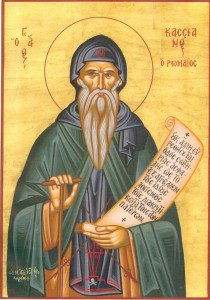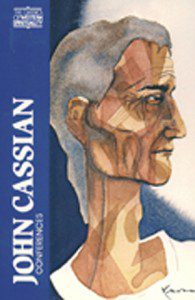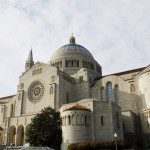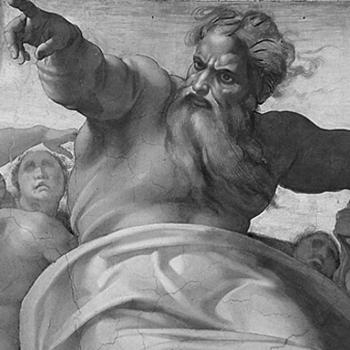
February 29 is the feast day of St. John Cassian — who, in addition to being a “leap year saint” is also one of the most important early contemplatives in the Christian tradition.
Cassian (ca. 360-435) brought monasticism — and, therefore, contemplative spirituality — from the deserts of the Middle East to Western Europe. His birthplace is uncertain, but by the 380s he was living in a monastery in Bethlehem; subsequently he left that location to travel the deserts of Egypt, where he and his spiritual friend Germanus received spiritual direction from the desert fathers.
The story of this journey, along with the wisdom the two young monks gleaned, is recorded in Cassian’s The Conferences, one of two important books he wrote toward the end of his life, after he settled in Europe (near Marseille) where he established what is generally regarded as the first European monastery. His other book, The Institutes, concerns the administration of a monastery and the “spirits” of deadly sins such as gluttony, avarice or anger.
As a record of instruction from several of the desert dwellers of the fourth century, all of Cassian’s writing is priceless, but two of the conferences specifically deal with instructions on prayer, providing one of the earliest written records of meditation instruction in the Christian faith.

Cassian reports that Abba Isaac taught him and Germanus both the importance and the manner of contemplative prayer. “The end of every monk and the perfection of his heart direct him to constant and uninterrupted perseverance in prayer,”[i] declared the old man. Abba Isaac saw perpetual prayer as the result of a tranquil mind that has been liberated from earthly passions. He discusses different forms of prayer, including supplication, vows, intercession, and thanksgiving.
But beyond these forms of vocal prayer, “a still more sublime and exalted condition follows… fashioned by the contemplation of God alone and by fervent charity, by which the mind, having been dissolved and flung into love of him, speaks most familiarly and with particular devotion to God.” [ii] Abba Isaac goes on to point out that true prayer arises from the love of God (who first loved us) and leads to union — not only with God, but also with all others who share our devotion to Christ.
Everyone “who longs for the continual awareness of God should be in the habit of meditating on it ceaselessly in his heart, after having driven out every kind of thought”[iii] — a sentence which reveals how the ancients saw thought as emanating not from the brain, but from the heart.
But how does one “drive out every kind of thought” in order to meditate and cultivate an ongoing awareness of the presence of God? Cassian reports that Abba Isaac recommends using a verse form scripture as a continual prayer word, to be repeated continually: “O God, come to my assistance; O Lord, make haste to help me.” (Psalm 69:2, Douay-Rheims Version).[iv]
This simple meditation practice — of reciting a scripture verse repeatedly as a way to train one’s attention on God rather than on extraneous distractions — became the foundation of the Orthodox “Jesus Prayer” discipline (as celebrated in The Way of a Pilgrim and The Philokalia) and also can be seen as the earliest form of contemplative practices such as promoted by The Cloud of Unknowing or the modern-day centering prayer movement.
Prayer was not the only topic that Cassian wrote about. The Conferences include discussions of vice and virtue, spiritual knowledge, and friendship. In the conference on friendship, Cassian (quoting the desert father Abba Joseph) offers practical advice on the psychology and ethics of friendship, recognizing that true spiritual friendship must be grounded in the love of God, for God is love.
Today’s blog post is an excerpt, in slightly different from, from my book Christian Mystics: 108 Seers, Saints and Sages.
Enjoy reading this blog?
Click here to become a patron.
[i]. Cassian, John Cassian, the Conferences., p. 329.
[ii]. ibid., p. 340.
[iii]. ibid., p. 379.
[iv]. Most Protestant and newer Catholic Bibles number the Psalms differently than the Douay-Rheims version. In such versions, this verse is Psalm 70:1.














